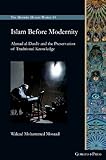Islam Before Modernity : Aḥmad alDardīr and the Preservation of Traditional Knowledge / Walead Mosaad.
Material type: TextSeries: The Modern Muslim World ; 14Publisher: Piscataway, NJ : Gorgias Press, [2022]Copyright date: ©2022Description: 1 online resource (370 p.)Content type:
TextSeries: The Modern Muslim World ; 14Publisher: Piscataway, NJ : Gorgias Press, [2022]Copyright date: ©2022Description: 1 online resource (370 p.)Content type: - 9781463243814
- 297.6/1 23//eng/20220622eng
- online - DeGruyter
| Item type | Current library | Call number | URL | Status | Notes | Barcode | |
|---|---|---|---|---|---|---|---|
 eBook
eBook
|
Biblioteca "Angelicum" Pont. Univ. S.Tommaso d'Aquino Nuvola online | online - DeGruyter (Browse shelf(Opens below)) | Online access | Not for loan (Accesso limitato) | Accesso per gli utenti autorizzati / Access for authorized users | (dgr)9781463243814 |
Frontmatter -- TABLE OF CONTENTS -- Acknowledgments -- Chapter 1. Introduction -- Chapter 2. Al-Dardīr and the Foundations of the Islamic Educational Paradigm -- Chapter 3. Al-Dardīr’s Sufi-Theology: Synthesis of Kalām and Taṣawwuf Epistemologies -- Chapter 4. Weighted synthesis (tarjīḥ) and al-Dardīr’s Methodology Regarding the Fiqh Tradition -- Chapter 5. Al-Dardīr: ‘Ālim, Sufi, and Intercessor for the Masses -- Conclusions -- Appendix. Translation of al-Dardīr’s Minor Creed -- Bibliography -- Index
restricted access online access with authorization star
http://purl.org/coar/access_right/c_16ec
This book examines the role of tradition and discursive knowledge transmission on the formation of the ‘ulamā’, the learned scholarly class in Islam, and their approach to the articulation of the Islamic disciplines. The basis of this examination is the twelfth/eighteenth century scholar, Aḥmad ibn Muḥammad al-Dardīr, an Egyptian Azharī who wrote highly influential treatises in the disciplines of creedal theology, Mālikī jurisprudence, and taṣawwuf (Sufism). He also occupied a prominent role in the urban life of Cairo, and is accredited with several incidents of intercession with the rulers on behalf of the Cairo populace. This book argues that a useful framework for evaluating the intellectual contributions of post-classical scholars such as al-Dardīr involves the concept of an Islamic discursive tradition, where al-Dardīr’s specific contributions were aimed towards preserving, upholding, and maintaining the Islamic tradition, including the intellectual “sub-traditions” that came to define it.
Mode of access: Internet via World Wide Web.
In English.
Description based on online resource; title from PDF title page (publisher's Web site, viewed 01. Dez 2022)


